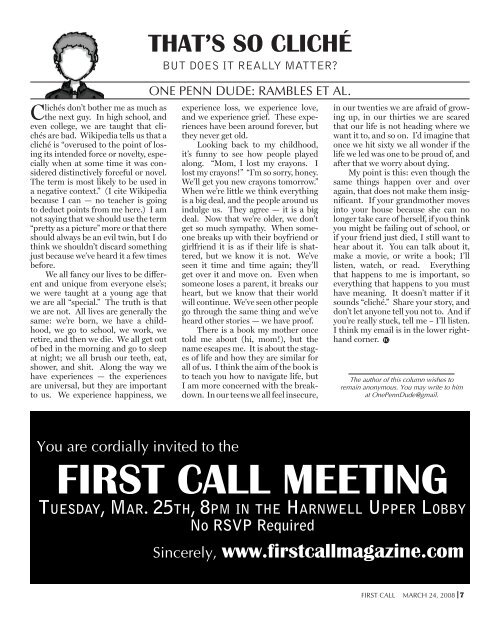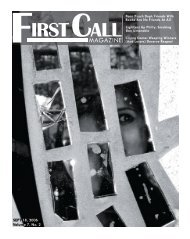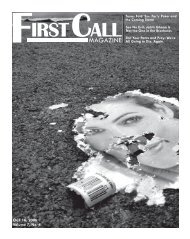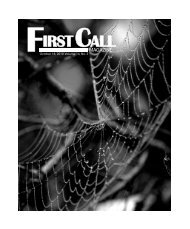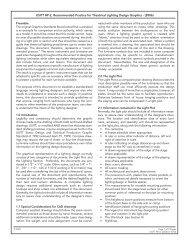MAGAZINE - Dolphin.upenn.edu - University of Pennsylvania
MAGAZINE - Dolphin.upenn.edu - University of Pennsylvania
MAGAZINE - Dolphin.upenn.edu - University of Pennsylvania
Create successful ePaper yourself
Turn your PDF publications into a flip-book with our unique Google optimized e-Paper software.
Clichés don’t bother me as much as<br />
the next guy. In high school, and<br />
even college, we are taught that clichés<br />
are bad. Wikipedia tells us that a<br />
cliché is “overused to the point <strong>of</strong> losing<br />
its intended force or novelty, especially<br />
when at some time it was considered<br />
distinctively forceful or novel.<br />
The term is most likely to be used in<br />
a negative context.” (I cite Wikipedia<br />
because I can — no teacher is going<br />
to d<strong>edu</strong>ct points from me here.) I am<br />
not saying that we should use the term<br />
“pretty as a picture” more or that there<br />
should always be an evil twin, but I do<br />
think we shouldn’t discard something<br />
just because we’ve heard it a few times<br />
before.<br />
We all fancy our lives to be different<br />
and unique from everyone else’s;<br />
we were taught at a young age that<br />
we are all “special.” The truth is that<br />
we are not. All lives are generally the<br />
same: we’re born, we have a childhood,<br />
we go to school, we work, we<br />
retire, and then we die. We all get out<br />
<strong>of</strong> bed in the morning and go to sleep<br />
at night; we all brush our teeth, eat,<br />
shower, and shit. Along the way we<br />
have experiences — the experiences<br />
are universal, but they are important<br />
to us. We experience happiness, we<br />
That’s so cliché<br />
But does it really matter?<br />
One Penn Dude: Rambles et Al.<br />
experience loss, we experience love,<br />
and we experience grief. These experiences<br />
have been around forever, but<br />
they never get old.<br />
Looking back to my childhood,<br />
it’s funny to see how people played<br />
along. “Mom, I lost my crayons. I<br />
lost my crayons!” “I’m so sorry, honey.<br />
We’ll get you new crayons tomorrow.”<br />
When we’re little we think everything<br />
is a big deal, and the people around us<br />
indulge us. They agree — it is a big<br />
deal. Now that we’re older, we don’t<br />
get so much sympathy. When someone<br />
breaks up with their boyfriend or<br />
girlfriend it is as if their life is shattered,<br />
but we know it is not. We’ve<br />
seen it time and time again; they’ll<br />
get over it and move on. Even when<br />
someone loses a parent, it breaks our<br />
heart, but we know that their world<br />
will continue. We’ve seen other people<br />
go through the same thing and we’ve<br />
heard other stories — we have pro<strong>of</strong>.<br />
There is a book my mother once<br />
told me about (hi, mom!), but the<br />
name escapes me. It is about the stages<br />
<strong>of</strong> life and how they are similar for<br />
all <strong>of</strong> us. I think the aim <strong>of</strong> the book is<br />
to teach you how to navigate life, but<br />
I am more concerned with the breakdown.<br />
In our teens we all feel insecure,<br />
in our twenties we are afraid <strong>of</strong> growing<br />
up, in our thirties we are scared<br />
that our life is not heading where we<br />
want it to, and so on. I’d imagine that<br />
once we hit sixty we all wonder if the<br />
life we led was one to be proud <strong>of</strong>, and<br />
after that we worry about dying.<br />
My point is this: even though the<br />
same things happen over and over<br />
again, that does not make them insignificant.<br />
If your grandmother moves<br />
into your house because she can no<br />
longer take care <strong>of</strong> herself, if you think<br />
you might be failing out <strong>of</strong> school, or<br />
if your friend just died, I still want to<br />
hear about it. You can talk about it,<br />
make a movie, or write a book; I’ll<br />
listen, watch, or read. Everything<br />
that happens to me is important, so<br />
everything that happens to you must<br />
have meaning. It doesn’t matter if it<br />
sounds “cliché.” Share your story, and<br />
don’t let anyone tell you not to. And if<br />
you’re really stuck, tell me – I’ll listen.<br />
I think my email is in the lower righthand<br />
corner. FC<br />
The author <strong>of</strong> this column wishes to<br />
remain anonymous. You may write to him<br />
at OnePennDude@gmail.<br />
You are cordially invited to the<br />
FIRST CALL MEETING<br />
Tu e s d ay, Ma r. 25t h, 8p m in t h e Ha r n w e l l Up p e r Lo b b y<br />
No RSVP Required<br />
Sincerely, www.firstcallmagazine.com<br />
FIRST CALL MARCH 24, 2008 7


